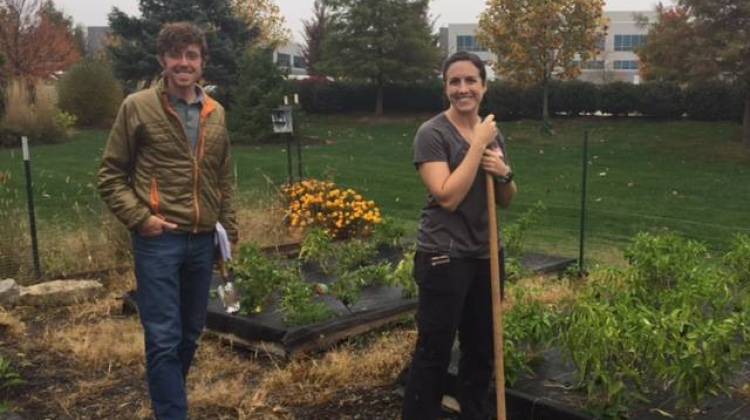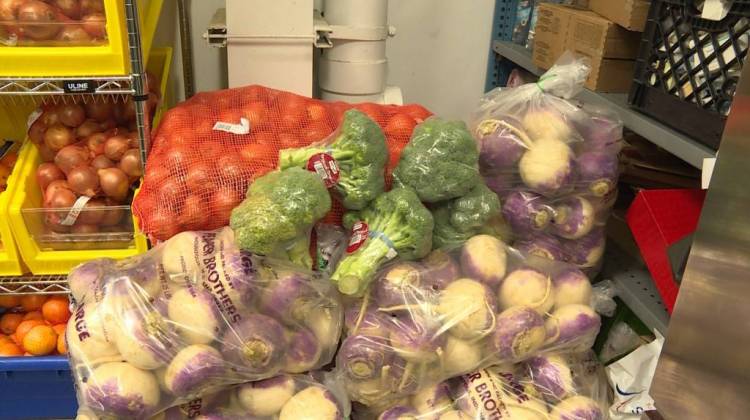
Claire Lane and Andrew Fritz work at the garden at St. Christopher's Episcopal Church.
(Jill Sheridan/IPB News)Food pantries are an important part of the safety net for the one in six Hoosiers who struggles with hunger. But pantries face a lot of obstacles when it comes to providing fresh, healthy food.
One project in Hamilton County is tapping into the power of urban gardening to stock pantry shelves with local produce.
“Some pantries are at the mercy of what gets donated, so it’s a lot of pasta and carbs and a lot of salt,” says urban conservationist Claire Lane. “A lot of kids or adults they might be obese and well feed but they are eating the wrong things.”
Lane works for the Hamilton County Soil and Water Conservation District. She's using a $50,000 federal grant to improve the pipeline between urban gardens and food giveaway programs.
One of the more successful programs in Hamilton County is at St. Christopher’s Episcopal Church in Carmel, and in early November, vegetables were still growing on the vines in their community garden.
Parishioners like Wayne Gartner volunteer to grow the veggies that local food pantries need the most – familiar ingredients that people can easily incorporate into their meals.
Gartner has been keeping track of the number of vegetables they’ve harvested.
“132 onions, 412 carrots, 1,666 hot peppers,” Gartner says.
Jalapeño peppers are very popular among the large Hispanic population that uses the pantries, Gartner says.
But Lane says there’s more to solving this problem than planting seeds. She says smaller pantries have limited resources: small, hard-working volunteer staffs don't have enough time to make connections with urban gardens or other sources of fresh food.
She hopes to help by creating a network between urban gardens and pantries so there is better coordination. With fresh produce, time is always of the essence.
“If the pantry’s pick-up day is Wednesday and the garden is delivering on Thursday, that food doesn’t keep until next week,” says Lane.
Lane’s solutions are representative of a trend in reducing Indiana’s food deserts and increasing access to healthy food.
Emily Weikert Bryant, the executive director of Feeding Indiana’s Hungry, says access to healthy food is a concern for many of their clients.
“We know many have health issues, about a third of them have diabetes, (and) a number of them have hypertension,” Weikert Bryant says.
Because of the need, food networks and federal food programs have expanded farm-to-pantry programs -- and other ways to get fresh produce onto people’s plates -- in the last few years.
“Because we’re serving so many in that community,” Weikert Bryant says, “we’re serving about one in six Hoosiers.”
Merciful Help Center food pantry in Hamilton county serves more than 100,000 people every year.
St. Christopher’s Episcopal Church is already providing the pantry with fresh produce and they’re not the only one says director Jane Slaton.
“We had a farmer recently and he decided to do a whole field and give us fresh beans for the whole season,” Slaton says. “Which is so great.”
A volunteer dietician at the Merciful pantry created a point scale to determine healthfulness. Seh also distributes recipes to show people how to use fruits and veggies they aren’t familiar with, such as turnips.
She looks at the produce they're getting and prints recipes, like mashed turnips, turnips with crispy bacon, and roasted turnips.
Food and garden education, better communication between farm and pantry – this is the new face in the fight against food insecurity in Indiana.
 DONATE
DONATE









 Support WFYI. We can't do it without you.
Support WFYI. We can't do it without you.